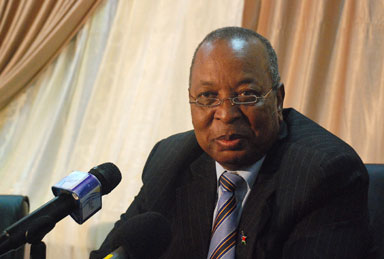S. Sudanese minister urges change to tackle economic crisis
May 4, 2016 (JUBA) – South Sudan’s finance minister, David Deng Athorbei has urged ministry’s staffs to embark on efforts to address the country’s current economic crisis.

“I am not new in the ministry. I am old here but I have to tell you that this time is time of work. We have to work very hard. If we are committed, our performance will change and South Sudan’s economy will improve,” he said.
South Sudan’s new Transitional Government of National Unity faces an uphill task of reviving an economy largely dependent on oil resources to support its budget.
The oil sector, which accounts for over 90 per cent of government revenues, has been badly affected the recent war, in addition to the decline in oil prices on world markets.
Commodity prices also shot up due to the devaluation of the local currency, South Sudanese pound, which has gravely impacted on the transport sector in the country.
Deng said the current economic crisis demands extra efforts from the finance ministry.
“If the ministry of finance and economic planning has to change, every employee will need to change and if we do not do well, all South Sudanese will be angry with us. Let us concentrate so that our country goes ahead,” he said without further details.
In June 2014, oil prices dropped from $112 to $30 per barrel. South Sudan currently produces 160,000 barrels of crude oil from 350,000 per day before war broke out.
Analysts are optimistic that donor nations like the United States, Japan and China will aid the economy. Such assistance, however, will require that South Sudan to initiate economic reforms, fight corruption and improving its human-right records.
Last week, the U.S. government announced more than $86 million in additional humanitarian assistance to help conflict-affected people in South Sudan and refugees in the region. The fund will reportedly provide much-needed safe drinking water, emergency health care, nutrition services, shelter, improved sanitation facilities, agricultural training, seeds and tools for the most vulnerable families and communities.
South Sudan’s largest single donor of humanitarian assistance, the US has reportedly donated nearly $1.6 billion since the start of conflict in the country in December 2013.
(ST)
